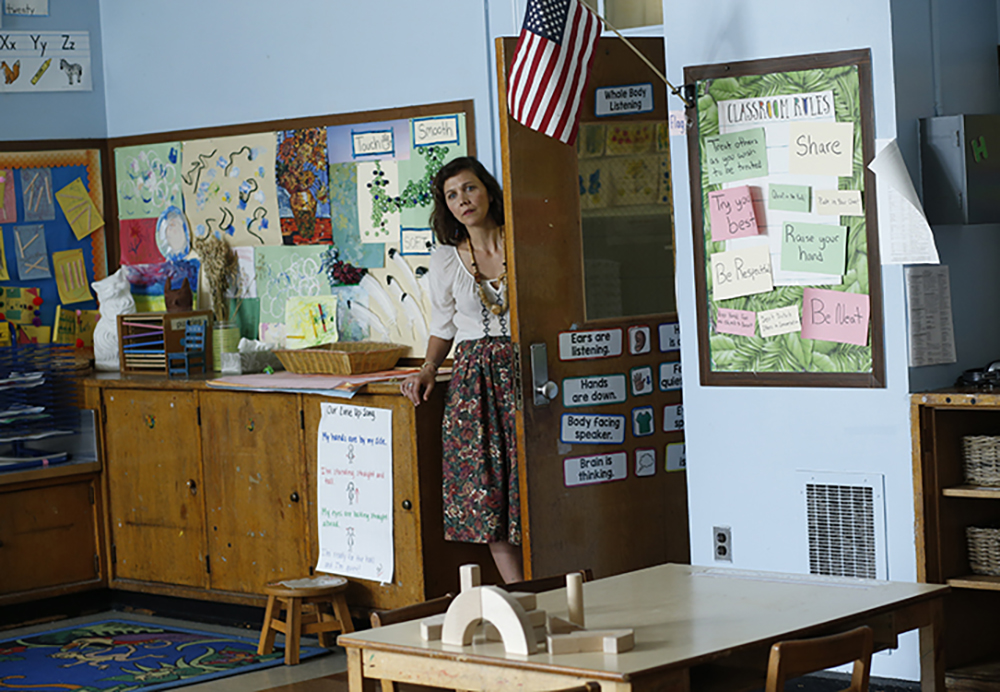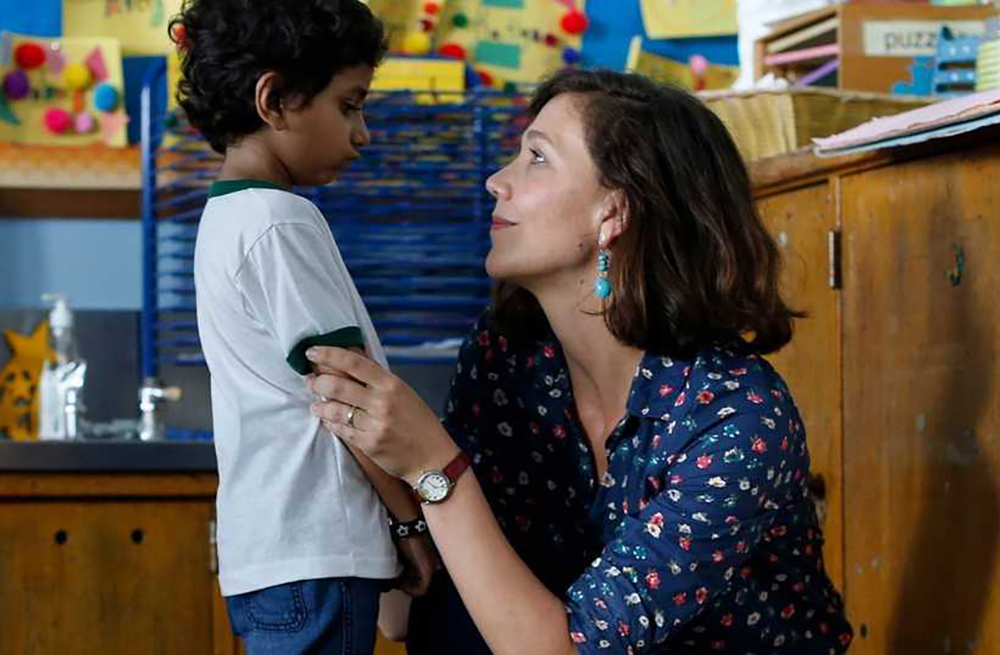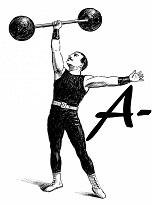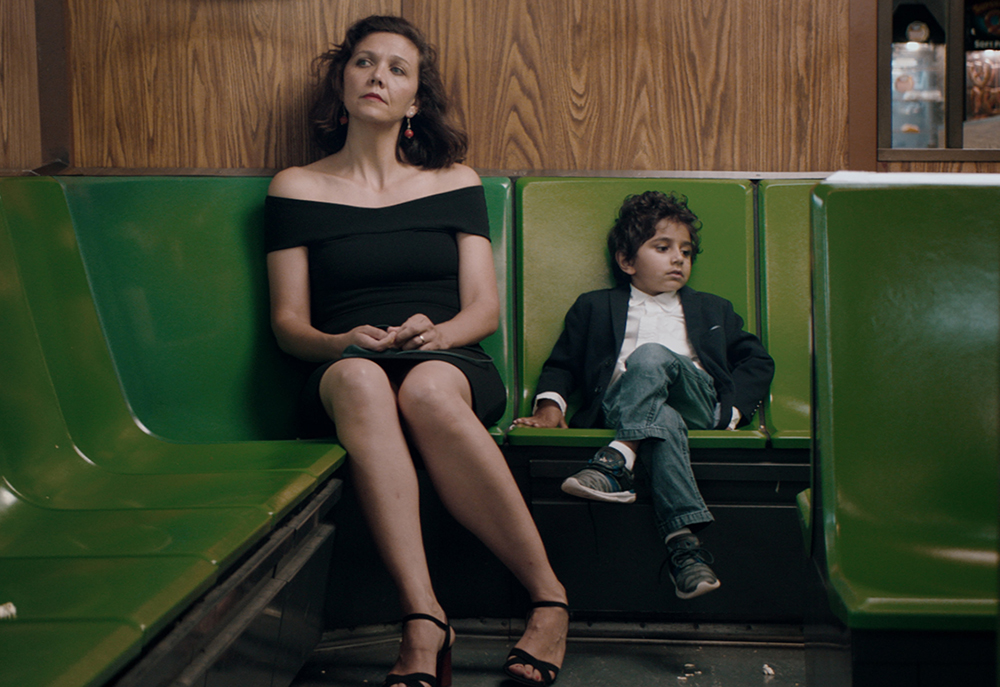“The Kindergarten Teacher” is a perfect example of a film that shows us a heightened version of ourselves. Written and directed by Sara Colangelo, “The Kindergarten Teacher” is a 2018 psychological drama centered around an amazing performance by Maggie Gyllenhaal as Lisa Spinelli, an unfulfilled kindergarten teacher from Staten Island. The film is based on an Israeli film by the same name from 2014.
Lisa teaches kindergarten every day, and returns to a distant family in the evening. In an attempt at fulfillment, she attends a poetry class every week, led by her teacher Simon played by Gael García Bernal. Her poetry is dismissed as derivative because, well, it is. Lisa’s day-to-day is clearly not what she wanted for herself. She complains of a lack of culture in her home, and suggests her assistant teacher is not intelligent. However, one day while waiting for the remainder of the students to get picked up from school Lisa overhears Jimmy, the cutest 5-year-old ever, reciting a poem he wrote and it’s good! Lisa reads the poem at her poetry class, where her classmates and Simon all express how much they love it. Lisa decides that Jimmy is a prodigy, and starts to dedicate her time towards what she sees as nurturing his talent but is actually an obsession that harms rather than helps Jimmy.
The beauty of Gyllenhaal’s character is that she is all too normal/regular. There are millions of Lisa Spinellis in classrooms, offices, and other professions everywhere: unfulfilled at work, out of touch with family, and most of all mediocre. Mediocrity is the key to Lisa Spinelli; and because she represents us, mediocrity is the key to our stories too. Billions of people are stuck in this, but those of us in developed nations are in a very specific position. We are no longer working just to survive but are going to college and trying to find fulfilling work more than ever.

However, most of us don’t have the courage to go after what we want, leaving us in mediocrity. That’s where Lisa is: like 90% of Americans, she is stuck in mediocrity with no way out. She lives in a prison of her own making. She designed her life this way. Who is to blame but herself?
Before you assume this doesn’t apply to you, think about it. By definition, most people are mediocre. How many people hate their job? How many people hate their spouses? How many people hate where they live? How many people are unable to find any time for their hobbies? How many parents desperately try to live vicariously through their children? The answer is a lot! We hear about these things all the time! We hear it from our friends, family, co-workers, and from ourselves. Most people are failures—and I don’t mean by some stupid capitalist metric; I mean by their own metrics. If getting to travel often is their idea of success, if having a big, happy family is their idea of success, if helping people is their idea of success, whatever it may be, they likely aren’t doing it. People usually just don’t go for it. This is why kids have dreams and adults don’t. Kids still think they’ll do it. Adults know they won’t.
Lisa, who is like so many people—not special in any way—finds her claim to success as she sees it in her eyes. Success, to her, is being able to foster artistic greatness in another if not in herself. She has, in her eyes, failed with her children and is unable to foster artistic greatness within herself as she is simply not good enough. Then, as if given to her by the gods, little Jimmy appears and is already under her care, already so impressionable, and has the clear potential to become an illustrious artist. To be the great teacher who fostered his creative talent and be the reason he was able to rise up and become a great poet is exactly what she wants. It seems so within reach!
Then we get to Simon, Lisa’s continuing education poetry teacher. He and Lisa are a parallel to Lisa and Jimmy. Simon does not care for or really notice Lisa until she begins reading Jimmy’s poems as her own. Simon, too, only wants a piece of Lisa once she looks like a student worth looking out for…worth attaching his own name to…worth making up for his mediocrity. Those who can not do, teach, right?

The big, distinguishing factor between Lisa and Simon is probably that Simon is a part of the world that he wants to be in and Lisa is not. Simon goes to these poetry readings in the city and likely does other things that Lisa doesn’t get to do. So when he finds out Lisa had been presenting Jimmy’s work in class as her own, he is reasonably upset and wants her to leave the class, calling her an art appreciator but not an artist: the role she serves to Jimmy, the artist.
“The Kindergarten Teacher” is an articulate exploration of mediocrity, but the carefully-planned themes of the script are not the only strong points of this movie. Maggie Gyllenhaal does not disappoint in this character-study. Her portrayal makes the main character extremely relatable despite the outlandish ways in which she acts out. Her every move is realistic and believable—even though it’s extreme. You both pity her and are kind of sickened by her. Now, that’s fine acting!
In addition, I truly found the costume design to have been a major contributor to Lisa Spinelli’s realness. The costume design was done by Vanessa Porter. Lisa Spinelli wears Birkenstock-like sandals with long skirts. She wears chunky statement necklaces and earrings. Her hair is never really done. These are the little details that make Lisa Spinelli immediately look like a kindergarten teacher. We absolutely can not under-estimate how these details work in our brains to fill out a fuller picture of the character.
I truly enjoyed “The Kindergarten Teacher” and recommend it to anyone that enjoys psychological dramas. I also want to recommend it to artists who are working towards their goals. Let this film be a reminder to never fall into a life where you have no creative outlet and form an unhealthy relationship with art as a consequence.



2 Comments
I like this take on the themes in the movie! Cool review!
I love the kindergarten teacher! I like this hot take🔥🔥🔥🔥